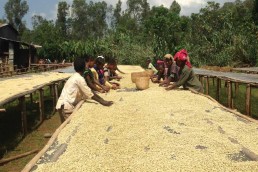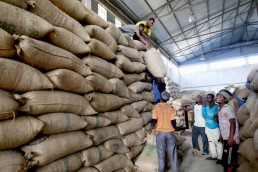SUGGESTED RECIPE
in: 21.5g | out: 46g | time: 24-26sec | temp: 93-95°C
this beautiful natural coffee from Ethiopia is exclusive to Play-Ground subscribers – we aren’t selling this one through our wholesale or retail channels (it’s one of the epic origins currently featured in our seasonal Real MVP blend). it features a round, creamy body with a smooth, intensely sweet aftertaste & notes of raspberry, orange & caramel.
FINER DETAILS:
origin: uraga, guji, ethiopia
producer: various smallholders
processing method: natural
species: arabica
varietal: bourbon, typica
elevation: 2100-2310m above sea level
roasted for: espresso


about me.
the Wolichu Wachu washing station was founded in 2017 & serves around 4,500 local smallholder farmers in and around the town of Haro Wachu, in the Uraga district of Guji. the average producer here farms on half a hectare of land & delivers coffee in cherry form to the washing station, where it is processed. coffees in Ethiopia are typically traceable to the washing station level, where smallholder farmers – many of whom own less than 1/2 hectare of land, and as little as 1/8 hectare on average – deliver cherry by weight to receive payment at the market rate. the coffee is sorted & processed into lots without retaining information about whose coffee harvest is in which bag or lot.
according to the washing station manager, 90 percent of the coffee delivered to the factory is bourbon, and 10 percent is typica: while these are two varieties better-known in Central & South America, the same terms are used colloquially in Ethiopia to describe certain coffee-berry-disease-resistant cultivars. the Ethiopian “bourbon” & “typica” varieties are typically genetically removed from the ones found elsewhere around the world.
Wolichu Wachu is equipped with sorting tables and floating tanks that are key to monitoring cherry quality at intake. here, the cherry clerk ensures that only the ripest cherries are processed. once accepted, the cherries are cleaned in fresh water. after cleaning, workers transfer the cherries straight to the drying field where they’re spread in a single layer. during the first few days, the coffee is carefully turned every 30 mins to ensure even drying. this is also when workers remove any damaged cherries. after a few days, the coffee is adjusted so it sits in a slightly thicker layer, which helps slow down the drying process.
as most producers in Ethiopia are smallholders, the majority continue to produce coffee using traditional methods. this means most coffee is grown without any chemical fertilisers or pesticides. the coffee is almost entirely cultivated, harvested & dried using manual systems.
